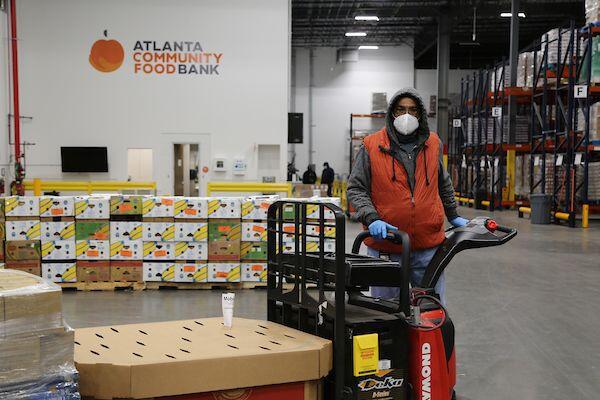
Caption
The Atlanta Community Food Bank is looking into alternative solutions to meet an expected rise in demand over the next few years as a result of federal funding cuts.
Credit: Atlanta Community Food Bank
LISTEN: The federal cuts to food assistance programs will affect over 1 million Georgians, who may turn to food banks for help. GPB's Amanda Andrews reports.

The Atlanta Community Food Bank is looking into alternative solutions to meet an expected rise in demand over the next few years as a result of federal funding cuts.
The Atlanta Community Food Bank is preparing for a major increase in demand over the next few years after Congress passed a bill cutting food assistance benefits.
The Trump administration’s “Big Beautiful Bill” will affect over 1 million Georgians who rely on the Supplemental Nutrition Assistance Program to eat. More people could begin turning to food banks for groceries.
The Atlanta Community Food Bank is already strategizing to maintain services with less food. Cuts to the U.S Department of Agriculture budget cancelled millions of dollars’ worth of food purchases headed to Georgia.
Kyle Waide is the CEO of the Atlanta Community Food Bank. He said the bank might distribute less food apiece in order to feed more families.
“So instead of getting five cans of vegetables, they can get three cans of vegetables," Waide said. "Instead of getting a bag of produce, they're going to get a half a bag of produce."
The ACFB works with over 700 community nonprofits across North Georgia that distribute food to over 250,000 households each month. That comes out to about $280 million worth of food and resources distributed each year.
Waide said the federal cuts to SNAP are estimated to be about the same size as the food bank's annual budget.
“So in effect, those cuts are the equivalent of really requiring us to double our volume in order to make up for that volume of food that is now no longer available,” he said.
Food banks across the state are working with one another on creative solutions. Plans include working with farmers across the Southeast and mobilizing volunteers.